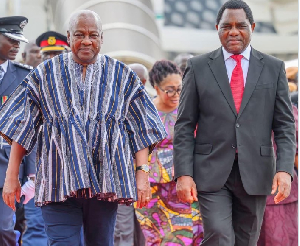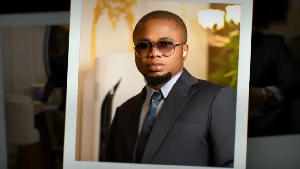By Kwame Ohene Asare
In England and Wales the right to silence can be found in the Police and Criminal Evidence Act 1984. The right to silence has undergone a couple of amendments since the Act was passed as the English and the Welsh struggled to balance the right of the Criminal not to incriminate himself against a high risk of giving the criminal an unfettered opportunity to fabricate his Defence. The right is pertinent to criminal proceedings although, there are serious lessons that can be drawn from it in relation to the on-going election dispute in Ghana in respect of the conduct of Dr Afari Gyan. Currently the right is as follows: ‘You do not have to say anything. But it may harm your defence if you do not mention when questioned, something you later on rely in Court. Anything you do say may be given in evidence in Court’.n say By way of explanation, you have the right to remain silent at all times. But if you fail to mention any facts that you later rely on in court the prosecution can use that against you. It may be inferred that your failure to mention very relevant facts then when questioned, which you later jump into the Witness Box to testify to, is likely to contain recent fabrications. This adverse inference is even stronger if at the time you were originally questioned, you had Legal Advice and/or representation.
The Chairman of the Electoral Commission did not file any affidavit in response to that of the Petitioners and indeed it was not until he appeared to be chastised by one of the Supreme Court Judges, that he began attending court proceedings.
Even then his initial response to accusations about his non-attendance and failure to file an affidavit was quite arrogant and insulting to even the Bench. The first gentleman of Ghana’s elections purported to be angry about not being told that he was ‘on air’ but ironically it was even after becoming aware of being ‘on air’ that he began furiously to hurl insult and abuse at his host. A man whose role and decisions in the Country require him to conduct himself with considerable decorum in public as his decisions can upset the peace and stability in the motherland, used words like ‘crazy’ and ‘stupid’ in the full knowledge that he was ‘on air’.
In my opinion, there was something more sinister that the Chairman may have been hiding from. His anger was not without motivation. He cannot purport to have been so surprised that he was on air. How can an important figure such as that feign ignorance about the possibility of being recorded in one form or the other whether on air or not; he was contacted by a stranger who does not even disguise his identity? How could he have been so shocked as to misconduct himself in the way he did? What was he frightened of?
Overall, the impression I gather as an objective bystander about the way Dr Afari Gyan has kept his silence without a word of written testimony until the morning of his oral testimony, is that he was probably avoiding the possibility that, he would have had to testify or depose to some falsehoods, which if discovered, would have led to more serious personal consequences for him, to wit, possible fraud and/or perjury. He listened to the Petitioners’ Witness and that of the 2nd and 3rd Respondents before comfortably offering to testify? Imponderable and Ludicrous!! In my opinion something more serious happened in the course of the December 2012 elections. It is more serious than the grounds openly relied on by the Petitioners in these proceedings. No one has referred to it yet and with the help of his Lawyers, Afari Gyan now knows that it will never arise, hence his confidence.
Admittedly, when Dr Afari Gyan began to attend the proceedings, he did so consistently. He attended regularly and seemed extremely attentive. Curiously the EC does not appear to have disclosed the likelihood that Dr Afari Gyan was to testify in the Witness Box. In point of fact, this was what all the Respondents, including the Commission, initially intended to do all along, hence their application/motion for extension of time within which to file their affidavits. That is, they wanted to be permitted to hear all of the Petitioner’s case before adducing any written testimonies in the first place. That sort of advantage is unheard off.
To add insult to injury, contrary to well established rules, Dr Afari Gyan has even been allowed to testify completely outside the contents of the Commission’s own written testimony/ies; this was in spite of Phillip Addison’s protestations.
Dr Bawumia was not given any breather as regards straying from his written testimony.
I must say that when Phillip Addisson of Counsel challenged Dr Afari Gyan from testifying, my gut instinct was for the Bench to reject his objection. This is because, it would appear that everyone wanted to hear from the horse’s own mouth, the Master of all elections since 1993! Even Phillip Addison’s opposition was not that spirited. However in hindsight the Master of Elections has been shown favour and has been granted what can at best be described as the right to Silence.
This is however clearly not fair. In Civil Litigation all parties are supposed to show their hand before the game commences. The Bench is also obliged to be consistent and fair and not to permit any party to appear to be given unfair advantage. Whilst Afari Gyan’s apparent lectures were fairly innocuous to the Petitioner’s case, he is using the opportunity to demonstrate his competence and sincerity, both of which could affect the court’s assessment of his credibility. His lectures are neither contained in his Deputy’s written testimony nor in his non-existent testimony. However, judging from the obvious discrepancies on the face of the documentary evidence in this case Afari Gyan cannot honestly contend that the elections were conducted competently.
Even putting the best construction on the evidence thus far, the Chair cannot pretend to be both competent and sincere if the elections he presided over had more than half of the relevant Pink Sheets ‘mistakenly’ completed. Furthermore, given the size of the error/s, if indeed they were mere errors, why did he not have a procedure for checking these pink sheets for some consistency as a competent administrator? Especially, in light of the fact that a substantial number of his staff as he claims, were new recruits.
In the words of Dr Afari Gyan himself, he found it important to emphasize to his staff about the importance of completing forms correctly as it could lead to the declaration of the wrong person as President.
What has Dr Afari Gyan been waiting for all this time? Was he waiting to construct his story? Was the learned Doctor dreading the possibility of being confronted with evidence more probative of ill-motivated wrong doing? He could not have been waiting for his confidence to build up? Afari Gyan simply had something to hide and his testimony now, which he has had opportunity to depose to earlier, should be taken with a pinch of salt as the English have learnt through experience to do with their criminal witnesses.
Kwame Ohene Asare
Principal Solicitor, Braidwood Law Practice Sols Croydon, Surrey, U.K.
Opinions of Saturday, 1 June 2013
Columnist: Asare, Kwame Ohene
Did Afari-gyan invoke his right to silence?
Entertainment













